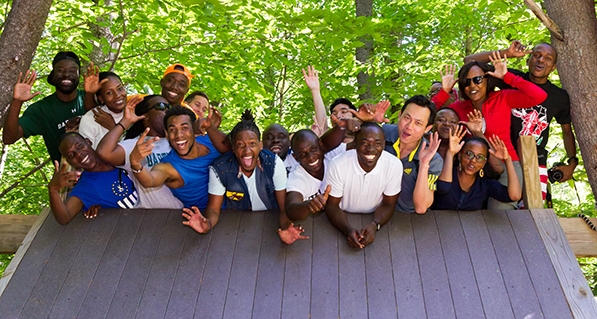Joel Almeida, a graphic designer and musician from Cape Verde, develops digital games and mobile apps inspired by African culture and mythology. He has come to Dartmouth to learn how to develop his company, Bonako, as a tool to help young people back home improve their lives and their communities through arts and design.

Emerging African business leaders from 17 countries across sub-Saharan Africa have come to Dartmouth this summer as Mandela Washington Fellows. (Photo by Lars Blackmore)
“I’m a designer—a creative person—not a business person, so I am excited to come to Dartmouth to get some knowledge about how to do business to prepare me for bigger work,” Almeida says.
He is also excited about the networking opportunities Dartmouth offers, and plans to spend time at the College’s Tiltfactor Laboratory while in Hanover. “I know there are people here who are working on this kind of project—creating games with social impact.”
Almeida is one of 25 emerging African business leaders from 17 countries across sub-Saharan Africa who have come to Dartmouth this summer as Mandela Washington Fellows. In the six-week Business and Entrepreneurship Institute at Dartmouth program, the fellows learn how to develop and promote their businesses with the goal of improving the economy and community infrastructure in their home countries.
This is the second year that the John Sloan Dickey Center for International Understanding has led Dartmouth’s collaboration with the U.S. State Department program, part of President Obama’s Young African Leaders Initiative (YALI).

As part of a team-building exercise, fellows completed the Dartmouth Ropes Course. (Photo by Lars Blackmore)
“Like last year, we’ve received an extraordinary group of young leaders,” says Dickey Center Director Daniel Benjamin, “and I think this year’s experience with the YALI program is going to enrich the College. The fellows bring so much intellectual firepower and real spirit to their time here—they really light up the campus for everyone who comes in contact with them.”
Benjamin says the institute makes an important contribution to international development, which is a pillar of the work at the Dickey Center.
“Thanks to the instruction they are getting, they’ll go home with a new set of tools to help them make a difference in their societies. And we’re learning more each year about how to advance this effort to help train leaders for Africa, which is gratifying, and we benefit from building a fast-growing network in Africa,” he says.
At Dartmouth, the fellows will collaborate in intensive workshops on human-centered design led by Thayer School of Engineering Associate Professor Peter Robbie; they will learn about developing their “pitch” and company mission with alumni entrepreneur Richard Nadworny ’82 at the DEN Innovation Center; and they will visit innovative area businesses, including King Arthur Flour and Timberland.
In addition, they will undergo leadership training with the Rockefeller Center for Public Policy and the Social Sciences, participate in weekly service projects through the Tucker Foundation, participate in team-building exercises with the Outdoor Programs Office, and have opportunities for weekend stays in the homes of the Upper Valley residents, and for outdoor activities.
Community members are invited to attend “Networking Nights” for the fellows on Wednesday nights, July 8 through 22, from 7-9, hosted by the Dartmouth Entrepreneurial Network (DEN) at 4 Currier Place in Hanover.
Hyasintha Ntuyeko is a telecom engineer from Tanzania who founded a business called Kasole Secrets, which develops organically made sanitary products to prevent menstrual complications. Issues such as a lack of water, poor health information, and cultural taboos create obstacles for women by keeping them out of school and the workplace, and by hindering civic and social engagement, Ntuyeko says.
She hopes to take what she learns through Dartmouth’s institute to expand Tanzania’s Hedhi Salama (safe menstruation) campaign, and to organize a national women’s health education program.
“I hope to get the knowledge at Dartmouth to expand my communications and organization and leadership skills to build a network of hygiene educators across all the geographic areas of Tanzania,” Ntuyeko says.
The cohort of fellows hosted by Dartmouth is part of a larger group of 500 Mandela Washington Fellows being hosted across the United States this summer. The young African leaders will meet with President Obama during a summit in Washington, D.C., the week of Aug. 2. In addition, the Dickey Center is working with the Dartmouth fellows to develop grant applications for the U.S. African Development Foundation, a federal agency that provides foreign aid through direct grants to local projects in the most needy communities of Africa.
Jacob Hamanenga of Zambia is a lecturer and researcher in financial mathematics at Copperbelt University in Zambia. He is developing a research and consulting enterprise to help establish a sustainable finance and insurance industry for Zambia. He says his connection to Dartmouth, known internationally as a highly ranked Ivy League institution, will build his reputation as he works to foster a stable insurance market in his country.
And he is impressed by the College’s dedication to “learning by doing,” he says.
“With the Dartmouth program in particular I am very much impressed with the outline of the courses and with the hands-on experience,” Hamanenga says.
“You go out and meet people in the community. You have leadership seminars and then you go climbing up the mountain. It seems like a simple thing, but it is team-building, not just talking about team-building. That way it seems quite easy for me to implement and put the ideas into practice,” he says.
The YALI Business and Entrepreneurship Institute at Dartmouth is a collaboration of the Dickey Center, the Rockefeller Center, the Tucker Foundation, Thayer School of Engineering, the Outdoor Programs Office, and the Office of Entrepreneurship and Technology Transfer.

